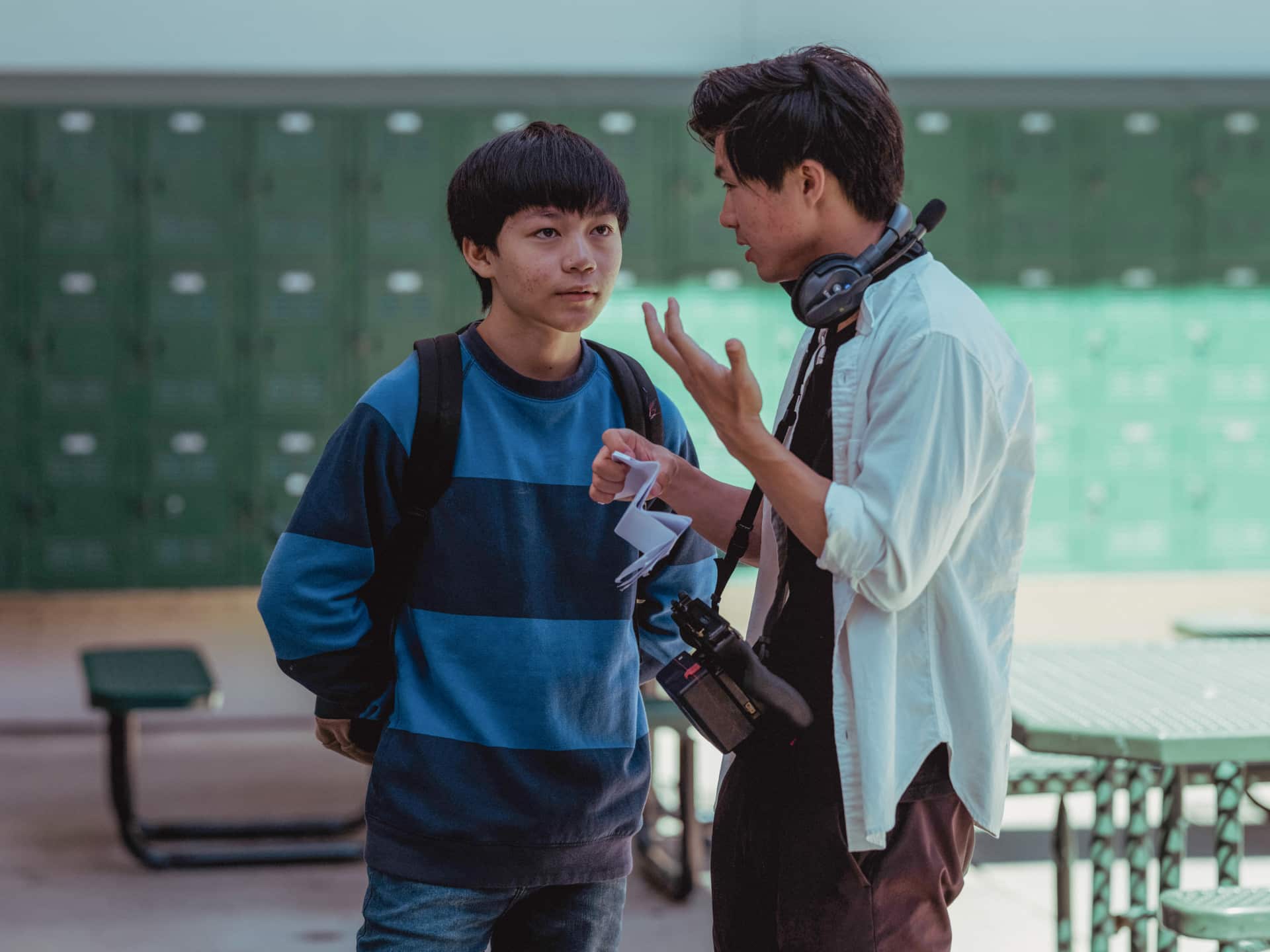
Not quite autobiographical, but deeply influenced by emotions and experiences from his childhood, director Sean Wang’s stirring first feature Didi follows 13 year-old Chinese-American Chris Wang (a wonderfully mature performance by young star Isaac Wang) during the final few months of Summer vacation.
The first day of High School looms, but for Chris, It’s a period of change in more ways than one: friendships he thought would last forever are beginning to fade; the sting of first love is finally rearing its terrifying head, and his relationship with his mother (the legendary Joan Chen) is in flux, growing ever strained by the cultural divide between the first-gen immigrant parent and second-gen immigrant child. “They were raised in a different place, their cultural references are different, their friends are different,” Wang says. “But they’re both desperate to understand each other.”
In many ways, Didi is a heartfelt ode to growing up in the new millennium, as it was truly felt by those living it. “Not many of the movies that were made in the late-2000s actually captured what it was like growing up during that time. Culturally, maybe. The jokes and crass comedy. But I don’t think American Pie is an accurate depiction of what the upbringing was like.”
Yet, it never wallows in its own nostalgia. Like Bo Burnham’s Eighth Grade, which feels like the film’s only true spiritual predecessor (though Wang mentions being inspired by early films like Stand By Me), Didi embraces the ache of adolescence—the first pangs of pressure one feels to project a constructed version of themself to the world, and then failing to live up to that projection over and over again. The hope, at the end of Didi, is that by bracing the hurricane of youth—the awkward moments, the joys, the loneliness—a truer self can emerge in the wake.
Director Sean Wang joined A RABBIT’S FOOT to talk growing pains, course-correcting the stereotype of the “Tiger Mom”, and bridging the gap between the 2000s and the present day in Didi.
Luke Georgiades: Your movie feels at once nostalgic and also a rejection of nostalgia. How did that come together for you?
Sean Wang: I knew it would be nostalgic by nature, simply because of the time period it’s set in, and there’s a nostalgia baked into all the things that are accurate to the time period: the internet, the phones, the music. But I didn’t want the movie to ever feel like “look how amazing things used to be, I miss it so much etc.” I wanted it to feel like you’re living through a perspective—and in 2008, those things weren’t nostalgic to them as they are to us now. There’s a warmth to it, but I wanted the nostalgia to be story driven and character driven, part of the story instead of just texture.
LG: It’s a hard line to tread, to be nostalgic but not let your story drown in it. You even used your childhood room as Chris’ room in the movie. Was that a trippy experience for you?
SW: Once we started shooting, it all came back to me. There were posters on this wall, and that wall was skate magazine tear-outs. But there were things in that room that were stickers from when I was in 8th grade. And we were like “ok…we can leave that up, that’s period accurate.” [laughs]. But it wasn’t necessarily a creative choice, but a convenient one.
LG: I’m aware that this isn’t completely autobiographical, but I know the themes are very personal to you. I watched Have A Good Summer again recently and I couldn’t help but correlate the doc as a sort-of sequel to Didi. In the movie it leaves some of Chris’ relationships up in the air—what kind of clarity did it bring you to revisit some of those people in your real life?
SW: The short and Didi both gave me two different feelings. With HAGS, I was going through that weird stage between adolescence and true adulthood, and I was wondering if my friends were going through that same thing. That gnawing anxiety of growing up. A lot of what that was for me was being the same age as my parents were when they immigrated to America. In comparison, what the hell am I doing with my life? That was a huge thing that they did. Seeing my friends relate to that feeling in their own ways in relation to their own lives made me feel a little less alone about that.
LG: Do you see a relation between the two films?
SW: I do feel like they’re cousins, but Fahad in the short and Fahad in real life are two different people. Me and Fahad are still friends, and in the film the characters break up, so people are going up to Fahad now like “did you and Sean break up?” And it’s like, no, that never happened. But there are so many people at that time in your life who you think you’ll be best friends with forever, and then the next year you’re hanging out with someone else. It’s about friendship and connection, and how some of those are lifelong, and some you think are going to be eternal but only last one summer.
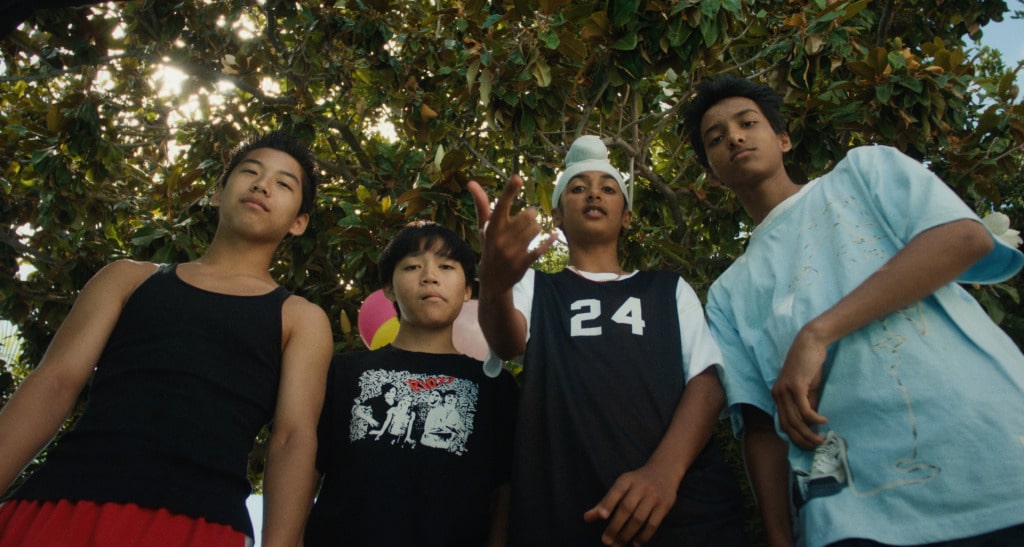
LG: It’s interesting because you grow older and feel closer to the plight of your parents, but as a second gen, you’re experiencing a totally different path. In HAGS, Fahad said “It’s hard for children of immigrants to 100% feel like their parents.” Is there something to that idea that you were exploring in Didi?
SW: The theme of “you can never fully relate to your parents” is magnified a hundred times in Didi. It’s the source of every conflict and is permeated through the entire movie. Me and Joan Chen, who plays the mother in the film, latched on to this idea that the conflict between her and Chris isn’t that he’s not an A+ student or the model child she expects him to be, it’s more about wanting to love her kids the way they need to be loved, but she doesn’t know how. The parents can never fully relate to their kids and the kids can never fully relate to their parents because of the generational gap, but in this case it’s also because of the cultural gap, too. It’s “mom, you will never fully understand the things i’m going through as an American kid.” And for the parents it’s the same: I want to connect with my kid but I literally can’t. They were raised in a different place, their cultural references are different, their friends are different.
LG: I was really happy to see Joan Chen in this film, as captivating as ever. Can you tell me a bit about why you wanted her specifically to play the mother here?
SW: We’re still in this time and place in the industry where Asian actor roles are expanding, but if you think of notable actors of Joan’s level of experience and calibre, it’s still pretty limited. It’s a shorter list than you might think. I knew her work, but what really planted the seed was Alan Yang’s film Tigertail, she has one scene but it’s one of the film’s defining scenes. She’s so sensitive and tender and soft spoken, but she carries such a presence and a weight. It’s exactly what I wanted the mom in DIDI to be. She’s not someone who makes a scene. She’s got to be captivating in her quietness. That’s what Joan brings to the movie, Her eyes alone are the best production value you could ever get. She says nothing and you feel everything. She’s a tried and true moviestar.
LG: This film has an immense amount of affection for her character. Did this feel like a correction in some ways to how you feel like Asian immigrant mothers have been portrayed in the past?
SW: That was a big motivation for her character and the movie: trying to depict an East Asian immigrant mother and son relationship that I hadn’t seen in movies before. A lot of my friends’ moms were a little bit closer to the mom in the movie than the domineering tiger moms that people attach to East Asian immigrant motherhood. I wanted to depict a mother that was confused in her own way and going through her own coming of age in the movie.
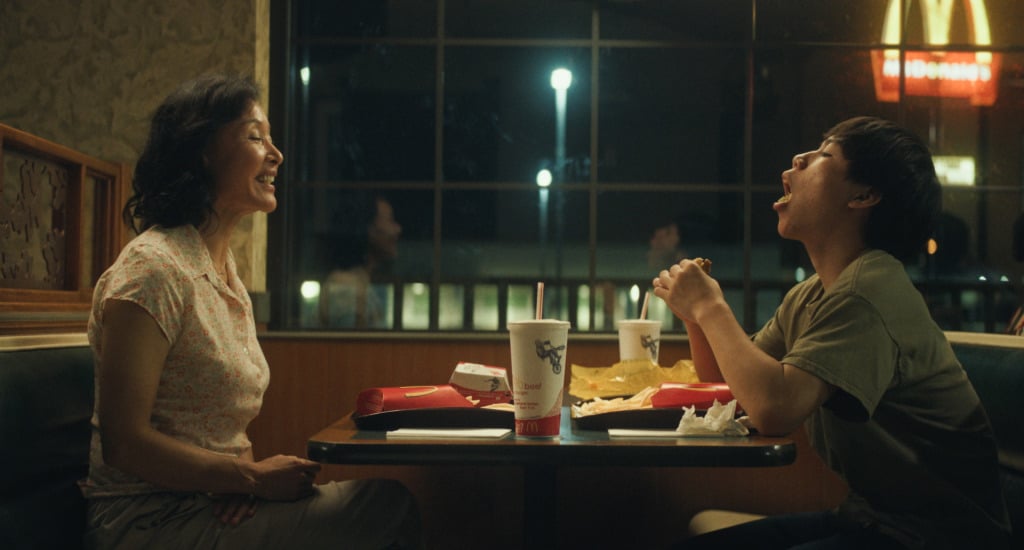
LG: A decision you made that I loved in this movie is that there’s very little mention of the father of the household, although his presence, or lack of, clearly hangs over each member of the family in its own unique way.
SW: There were earlier versions of the script where you see more of the dad, he leaves halfway through the movie and goes on a business trip to Taiwan. But it felt like more of an interesting route to make the father character like a phantom. You never see him, you never hear him, but can you feel him throughout the movie? Yes. You feel his presence through his absence. That was a fun creative challenge for me, to set up this character that you never see or hear but his absence informs every frame of the movie.
I also wanted to establish that it’s not like his dad walked out on the family. Joan Chen isn’t playing a single mom, but she’s single handedly raising her children. It’s something you don’t really get an understanding of until you’re an adult.
LG: What was it like coaching Izaac and some of the other kids on what it was actually like back then? I wonder what he found similar and different about the cultural languages and customs between these two generations of adolescents.
SW: It was more removing than it was adding. They would say things like “deadass” and I’d be like “no, that wasn’t a thing in the 90s. Do that again but don’t say deadass.” But otherwise there wasn’t too much I had to do to draw the line between myself and him. The bet that I took on the movie was that though the cultural context is different between our generations, there wouldn’t be as big a gap regarding the pattern of growing up than one might think. I can watch movies like Stand By Me and the 400 Blows, which take place decades ago, and I still understand those kids. I get it. Everything around you changes as you grow up, but I don’t think that age fully ever changes. You’re still embarrassing and sad and irreverent, and stupid and lonely and confused. So it was about empowering them to shrug off any preconception that they would have to act like a teenager back then. Just act like a teenager now and we’ll surround you with the elements that make it culturally consistent to the period. But the energy is the same.
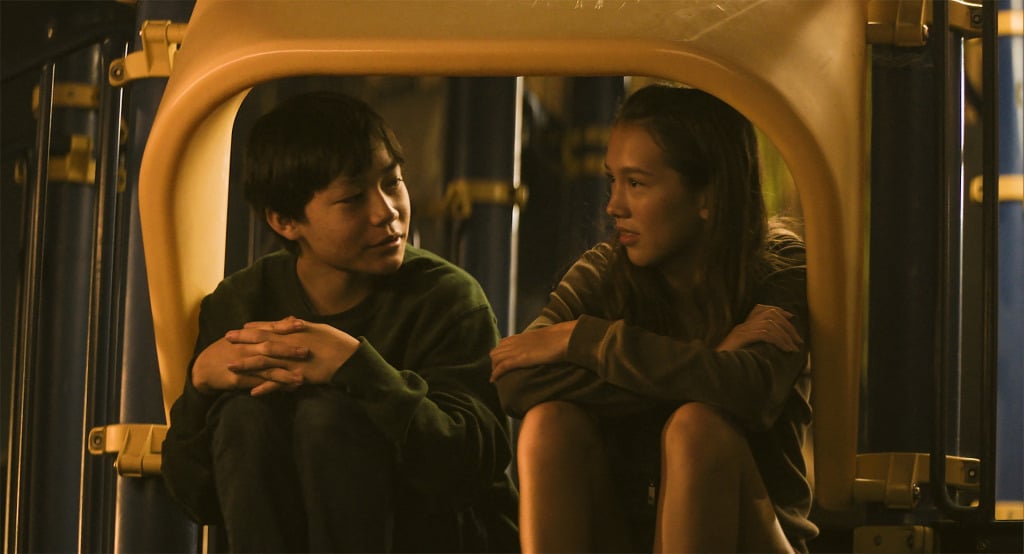
LG: Like Chris in the film, you’re the youngest sibling in your family. Which elements of younger sibling syndrome have found their way into the film based on your experiences?
SW: I think Chris is just like an annoying brat. One thing I was excited to subvert was when you see the younger sibling going into his brother’s room to try on his clothes and act cool, but in our movie he’s sneaking into his sister’s room and trying on her dress and tight skinny jeans. I thought that was fun. I think the youngest sibling always grows up looking to follow someone’s lead, they’re always looking upwards at their older siblings for some sort of guidance, before realising that will only take them so far. In the movie, Chris and Vivian are always fighting, and that’s their form of communication. Vivian, as the older sister, eventually realises that if she’s going to break that cycle, it’s going to have to come from her. So by the end, they’re working out this new vocabulary of communicating emotion that isn’t through conflict, which clearly feels alien to both characters, but also right.
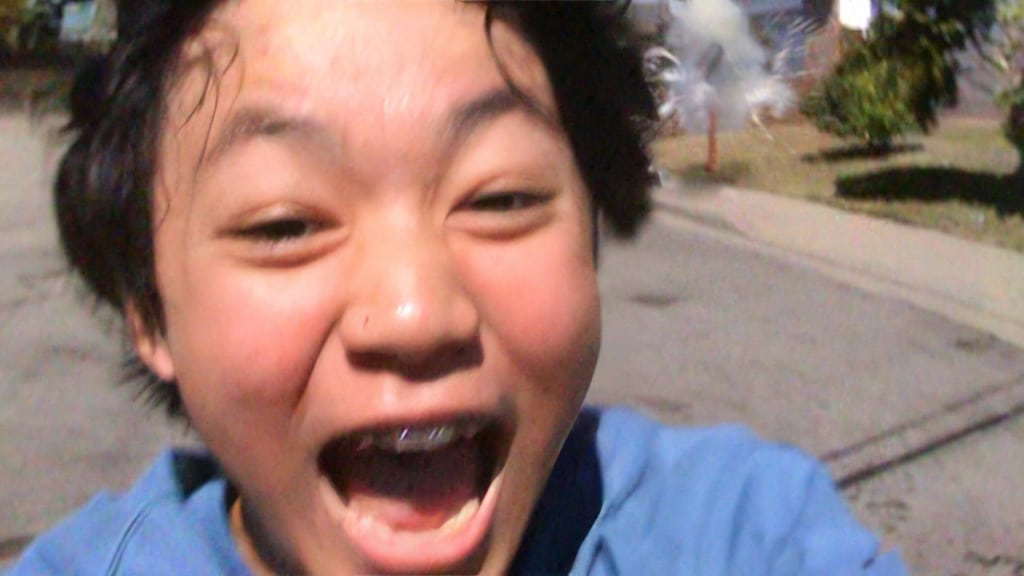
LG: That’s Chang Li Hua, your real grandmother playing Nai Nai in the movie. We know both your grandparents from Nai Nai and Wai Po from last year. Was it tough deciding which of them would play in the movie?
SW: So in the movie it’s Wai Po playing a character called Nai Nai. The real Nai Nai was a little too old, you know, production can be intense. I asked her and she was like “nah, I’m way too old.” But Wai Po is the age that is scripted in the movie.
LG: She has a few intense scenes with Joan in the film. Did you encourage her to bring any of her own personal history into the role?
SW: She’s a natural, honestly. She did her homework, she ran lines with my mom, she marked up her script and came to set prepared. She definitely had opinions. I thought that role would be simple to flesh out—she’s my grandma, I’ve known her my whole life—, but I would be like “okay cool, i want you to wear this bracelet” and she’d be like “I don’t think my character would wear that bracelet.” [Laughs] I’d say “It’s a jade bracelet, Grandma-” and she’d cut me off and say “no, no, my character’s always doing chores and washing dishes, the jade bracelet would get in the way of that.” It was great.
LG: You curated a music playlist for the younger actors as a way to communicate some of that 2000s cultural energy. Did you show them any movies that you felt would specifically communicate that era, and if not, why was music the perfect medium for that?
SW: Music is such a visceral hit to the heart. When I listen to the music that shaped me at the time, I just know it by heart. I hear a freaking Paramore song from 2005, and I could have not heard that song for a decade, but I’ll know every syllable. In 20 years, I’ll know every word. That’s a staple of growing up, that those cultural relics of your childhood are just locked up somewhere in your brain. Not many of the movies that were made in the late-2000s actually captured what it was like growing up during that time. Culturally, maybe. The jokes and crass comedy. But I don’t think American Pie is an accurate depiction of what the upbringing was like. Music was a better gateway for that. Also, it’s not like I’m going to ask these thirteen year-olds to watch American Pie, and their moms be like “what are you showing my child?” [laughs].
Didi is available to watch in UK cinemas now.





